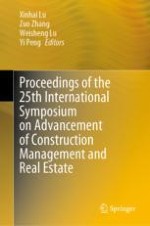2021 | OriginalPaper | Buchkapitel
Influencing Factors for Spatial Conflicts in the Resettled Community for Landless Peasants: A Perspective of Space Ternary Dialectics
verfasst von : Hui Gao, Kexi Xu, Haijun Bao
Erschienen in: Proceedings of the 25th International Symposium on Advancement of Construction Management and Real Estate
Verlag: Springer Singapore
Aktivieren Sie unsere intelligente Suche, um passende Fachinhalte oder Patente zu finden.
Wählen Sie Textabschnitte aus um mit Künstlicher Intelligenz passenden Patente zu finden. powered by
Markieren Sie Textabschnitte, um KI-gestützt weitere passende Inhalte zu finden. powered by
